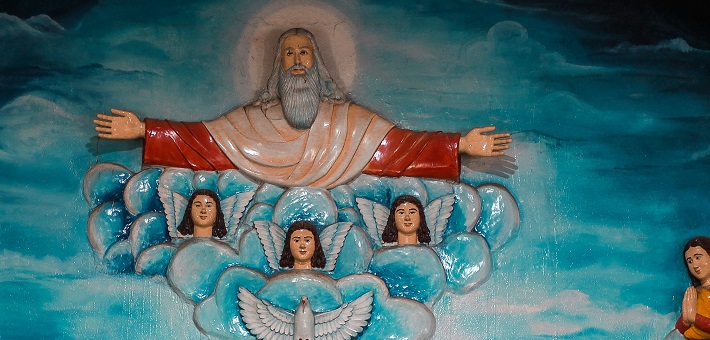Commentary on Isaiah 6:1-8
Isaiah 6:1–8 stands as a foundational passage in the book of Isaiah. It unveils a pivotal moment in the life of the prophet. He encounters the glory of God and receives a commission to speak to a people who hear but never understand, who see but never perceive (see verse 9). This passage delves into a divine revelation that shapes Isaiah’s identity, his mission, and the timeless nature of divine encounters with humanity.
This unit, presented as a first-person report, is a personal account of a momentous event in his life. It is a story with a plot and characters. The main ones are the prophet and God, but there are others, including the seraphs, the heavenly court, and “these people” who receive Isaiah’s message.
The opening verse sets the stage with a specific historical context: “In the year that King Uzziah died, I saw the Lord, high and exalted, seated on a throne; and the train of his robe filled the temple.” This temporal marker highlights the timing of Isaiah’s vision, coinciding with a significant moment in Judah’s history—the passing of a long-reigning king. This deliberate framing emphasizes the critical juncture in which Isaiah’s encounter with the divine occurs, suggesting a connection between the earthly political transition and the revelation of God’s sovereignty.
The vivid imagery highlights God’s majesty and sovereignty. The depiction of God as “high and exalted” portrays God’s unshakable authority, transcending earthly limitations. God does not die as King Uzziah did. The king’s death signaled the end of an era, but God’s reign stands forever. The imagery of God’s robe filling the temple conveys a sense of encompassing presence, signifying that God’s glory permeates all spaces, even transcending physical boundaries. This portrayal emphasizes God’s supreme position and underscores the idea that God’s sovereignty extends beyond the confines of the temple, involving the totality of creation. God is simultaneously present in the heavenly realm and within the fabric of the world.
In this presence, seraphs proclaim ceaselessly, “Holy, holy, holy is the Lord Almighty; the whole earth is full of his glory.” The repetition of “holy” accentuates God’s divine perfection and absolute sanctity. It is the powerful presence of the one who is radically other. Although the hem of God’s robe fills the temple, God’s glory fills all creation. Even the seraphs who attend the Lord must cover their “feet,” a euphemism for their nakedness, and their faces. No one can appear naked before the Lord, and no one can see God directly and live, not even the supernatural beings that guard the throne.
Isaiah’s response to this awe-inspiring theophany is profound humility and self-awareness. The text conveys the sense that Isaiah fears for his life. He becomes conscious of his unworthiness in the presence of the Holy One, exclaiming, “Woe to me! I am ruined! For I am a man of unclean lips, and I live among a people of unclean lips, and my eyes have seen the King, the Lord Almighty” (verse 5). Isaiah’s declaration is similar to a confession of sin and an expression of mourning both for himself and for the people. This sharp awareness of personal and communal inadequacy in the face of God’s holiness accentuates the disparity between human frailty and divine perfection.
In response to Isaiah’s acknowledgment of his unworthiness, one of the seraphs takes a burning coal from the altar and touches Isaiah’s lips, symbolically purifying him and declaring, “See, this has touched your lips; your guilt is taken away, and your sin atoned for” (verse 7). This act of purification appears elsewhere in Isaiah (1:25–26). It signifies God’s grace and forgiveness, cleansing Isaiah’s impurity and preparing him for the divine call.
The seraph pronounces Isaiah free of guilt and sin. Guilt is not a feeling but a state of being brought about by wrong behavior. Therefore, for sin and guilt to have “departed” or to have been “blotted out” means that the purification removes the effects of wrongful actions. However, the ritual cleanses the prophet but does not address the second part of Isaiah’s confession: that he lives “among a people of unclean lips” (verse 5). This suggests that Isaiah has been set apart from the people.
For the first time God speaks, and the voice reverberates through the temple. God does not speak directly to the prophet but to the heavenly court. This story climaxes when the prophet overhears the Lord asking, “Whom shall I send? And who will go for us?” Isaiah, transformed by the purifying touch and encouraged by God’s grace, says, “Here am I. Send me!” (verse 8). His willingness to be sent demonstrates a transformation from a sense of inadequacy and unworthiness to a readiness to heed God’s call and serve as God’s messenger.
This passage carries significance in comprehending the nature of God’s holiness, humanity’s response to God’s glory, and the divine commissioning of prophets. It unveils the paradox of God’s transcendence and immanence, God’s holiness juxtaposed with God’s redemptive grace extended to the repentant.
Isaiah 6:1–8 encapsulates a divine encounter and commissioning that shapes Isaiah’s prophetic ministry. It unveils God’s awe-inspiring holiness, the prophet’s humility in acknowledging his unworthiness, and the transformative power of God’s grace in equipping and sending forth God’s servants.
Isaiah’s vision serves as a template for those called to serve God—a call marked by an encounter with God’s holiness, leading to a profound awareness of personal inadequacies, followed by divine purification and a willing response to God’s commission. It challenges individuals to be receptive to God’s call, despite inadequacy, trusting in God’s grace to equip and empower them for the tasks set before them.
Although at the critical moment, Isaiah shows no hesitation, there are two points of resistance. He confesses his unworthiness (verse 5) and intercedes for the people. Resistance does not come so much from individual personality or weakness as from the experience of standing in God’s presence. Finding one’s vocation in the Christian journey requires verifying that God calls us. Following Isaiah’s example, we can resist, disagree with, and challenge even the God whose glory fills the whole earth.
This passage remains a timeless testament to God’s call and human response, inviting all to heed the divine commission with readiness and surrender. It is a reminder that in our divine-human encounter, questions are always welcome.


May 26, 2024